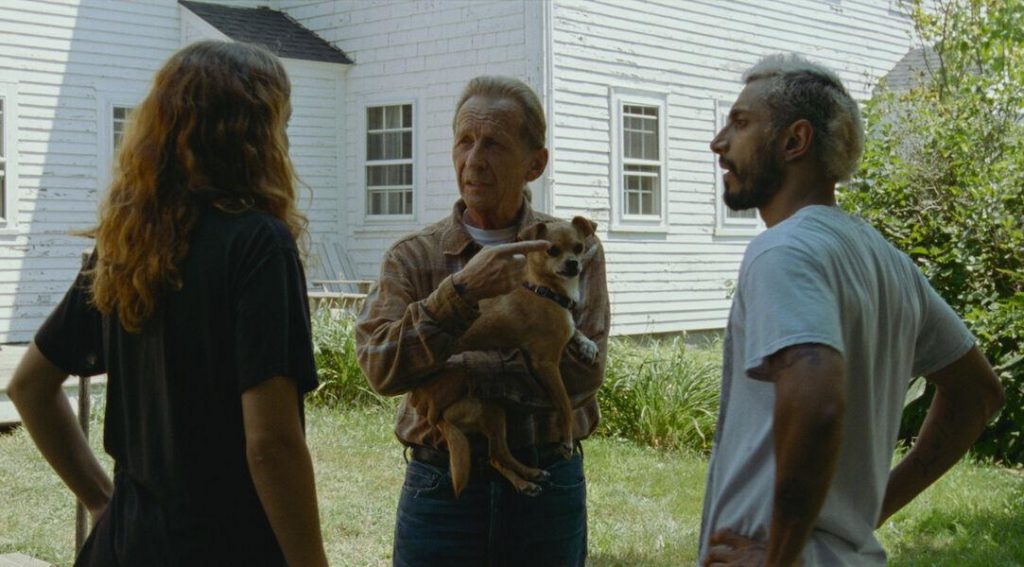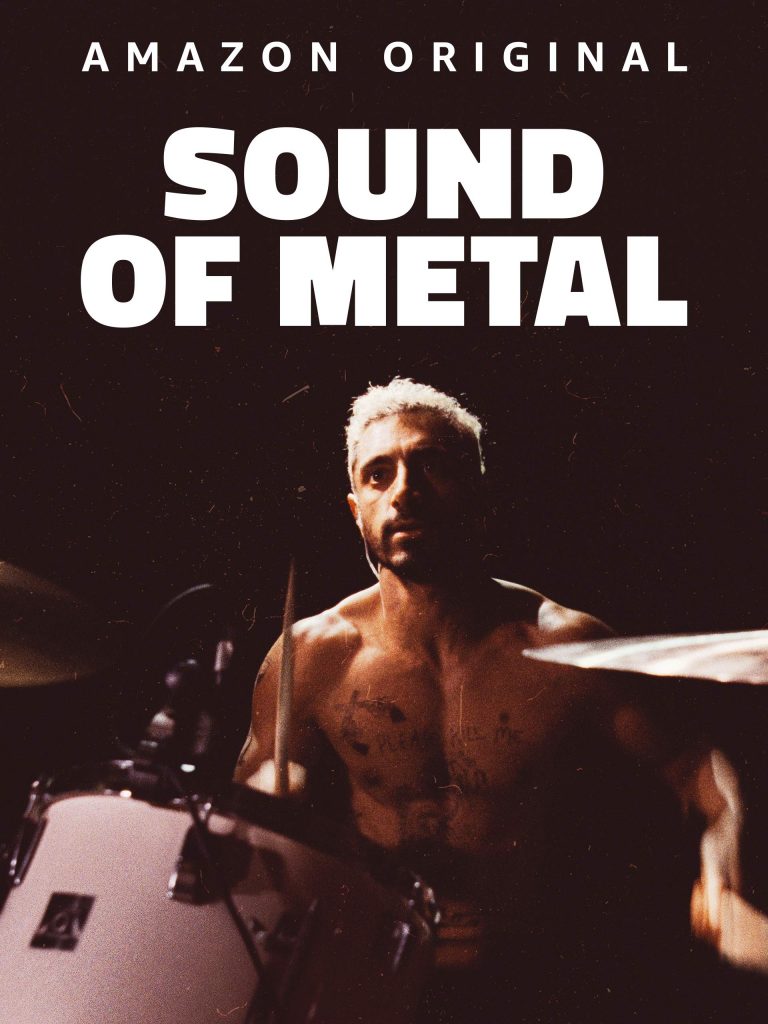4/5
Oscar Nominations:
Best Picture
Original Screenplay (Marder/Marder/Cianfrance)
Leading Actor (Riz Ahmed)
Supporting Actor (Paul Raci)
Sound (Becker/Baksht/Couttolenc/Navarrete/Bladh) WINNER
Film Editing (Mikkel E.G. Nielsen) WINNER
I’m not a ‘Heavy Metal’ music fan either. But if that is your reason not to see this movie (as it was for my wife), you are making a big mistake. Yes, there is some rather loud ‘music’ playing at the beginning of the movie. But it only lasts for a few minutes and then, actually, never asserts itself again. The scenes only establish the plausible reason why Ruben Stone (Riz Ahmed) loses his hearing, which occurs very quickly into the movie.
The film is classified in the Music genre, but I think incorrectly – it isn’t about heavy metal music but rather about a person, already severely ravaged by years of drug addiction (but clean for four years) who is suddenly confronted with an event that strikes at his very identity. It is the story of how he deals, for good and bad, with a substantial loss. As such, this movie is relevant to just about any of us and isn’t for those few who like this particular strain (forgive the pun) of music.
But the movie is definitely about Sound! It won the Oscar in the new category (Best Sound Design), which is an attempt to reduce the confusion most people (including myself) have over what might be the difference between Sound Editing and Sound Mixing. And I have to say that the win was more than deserved. Although I haven’t seen two of the nominees in this category, I have seen the other two and Sound of Metal is an obvious choice. (Mank got kudos for recreating a monaural sound track, consistent with movies of the 1950s time period, and Soul did a really effective job combining music and electronic sounds to simulate worlds beyond our known one.). But Sound of Metal succeeds in creating an environment for the audience that is consistent with the story.
The intelligence of the sound design works on many levels. For one thing, closed captioning is an intended part of the movie’s design, so do not turn subtitles off. Unless you already understand ASL (American Sign Language), you will need the captions to understand parts of the movie. There is also a scene where the main character is in Europe and his girlfriend and her father speak French. At first I didn’t understand why that scene was there, but I think its intent was to bring home the idea that we already live in a world of multiple languages, some of them audible. (There is another reason for this scene, that has to do with the changing relationship of the main couple.)
The real genius behind the creative use of sound in this movie is in how they move the audience into the world of the deaf or someone going deaf. The soundtrack moves, sometimes slowly and sometimes abruptly, back and forth between understanding clearly what is being said and a much muffled and distorted version of speech and sound. The shifts are intentional and make the viewer (or should I say hearer) transition perspectives from one character to another. And for those totally deaf, silence is a constant reminder of what your experience is of the world. Silence is also part of the movie’s design.
This is the second movie I’ve seen where sound is used so effectively to place the audience in the intended environment. The first was A Quiet Place (2018), which was nominated for Sound Editing (but in my opinion should have won). It was a horror movie, but made it into the Oscar list because, as I wrote in my review “It is so ground-breaking in its exploration of sound that it elevates in the viewer’s mind the power of the aural experience that is usually reserved for visuals.” Sound of Metal does that too. Through the use of sound, the viewer/listener learns to be in the place of people who cannot fully or partially hear things. What you hear, or not, is at least as important as what you see – and that is a critical message of this film.
Another comparison that I have to make is with one of my favorite movies from this year, The Father. In that movie, the production design, as well as the sound effects, all contributed to an eroding sense of place. The movie pushed us into the Alzheimer’s world by distorting what we thought we remembered. The Production Designers changed props and their locations, and even colors of the rooms as we struggled to keep up with what was really normal life, although seen through the eyes of a man who was slowly sinking into dementia. Sound of Metal does not quite achieve the same degree of dislocation, but it makes an admirable statement moving us into the world of the deaf and hearing impaired.
Sound of Metal also won the Oscar for Film Editing. The movie is composed of multiple, short scenes that are somehow stitched together into a remarkable whole. Film Editing is, perhaps, the quintessential skill that makes a movie different from all other forms of entertainment and Film Editor Nielsen does a remarkable job here of giving us just enough exposure to each scene – we don’t dwell unnecessarily and, still, nothing ends up disconnected.
Sound of Metal rated high on the Oscar buzz index having been nominated in four above-the-line categories. The nominated Original Screenplay was written by Darius Marder (also the director), his brother Abraham, and Derek Cianfrance who wrote the original story that was supposed to become a film, but never quite made it. There are multiple places where the writers capture the drama of Stone’s story, but I also fault them for not capturing the ending in a more satisfactory manner (more later).
Riz Ahmed was nominated for Leading Actor and, as all the critics rave, he did an amazing job. John Bleasdale (Sight&Sound) says “the standout element is Riz Ahmed’s magnificent performance. He plays Ruben as a man as tightly stretched as the skin of snare drum.” And Brian Tallerico (RogerEbert) wrote that a performer “needs to find a way to balance the unimaginable drama of something like going deaf with relatable humanity. One can see that empathy in every choice Ahmed makes in SOM. It’s inspiring.” Ahmed (a rapper, a Muslim, and a graduate of Oxford in Philosophy, Politics, and Economics) trained for eight months to learn the drums and sign language for this role. My only previous experience with him is when he played Jake Gyllenhaal’s photographer in Nightcrawler, another understated but near perfect performance.
Supporting actors, when good, are very important at making the movie work, and that is no exception here. Olivia Cooke plays Lou, his girlfriend, who understands how serious a problem Ruben’s loss of hearing is, especially in light of his history of addictions, and lovingly steers him into a therapy group. And Paul Raci, in the role of his lifetime, essentially plays himself, as he is the grizzled and stern leader of that therapy group. Nominated for Supporting Actor, Raci, who is the son of deaf parents and a leader of a heavy metal band that sings in sign language, delivers a memorable performance. I’ve seen four of the five nominees and Raci should have taken the Oscar as a true ‘supporting’ actor. (Kaluuya, in Judas and the Black Messiah, was a leading actor and shouldn’t have been in this category, which is why he probably won). Raci captures the essence of tough love as he confronts Ruben in an all-important scene that exposes the difficult decisions at the intersection of disability and addiction.
And the movie was nominated for Best Picture. That it didn’t win isn’t surprising. The sound design, Ahmed and Raci’s acting, and fast-paced editing all combine to make a wonderful picture, but it isn’t quite there. For me, a big part of the problem was the ambiguity of the ending. Picturesque and thoughtful, yes, but I don’t think it clearly communicated a message about where Ruben’s life was heading. It was one of those endings where you leave the film, head for the coffee shop, bar, or bedroom, and debate with your viewing partner what that all meant. Which direction did he end up going? Sure that means that everyone can, in effect, construct their own ending for the narrative, but that also means that the filmmakers failed to commit to their own idea of what it all meant – it is a weakness of purpose and message that in the end detracts from the story. But, see what you think.
This is a must-see movie for the sound design and the way it immerses the viewer/listener into the world of the deaf and hearing-impaired. Enjoy and be enlightened! (4 Stars)
Available on Prime Video


